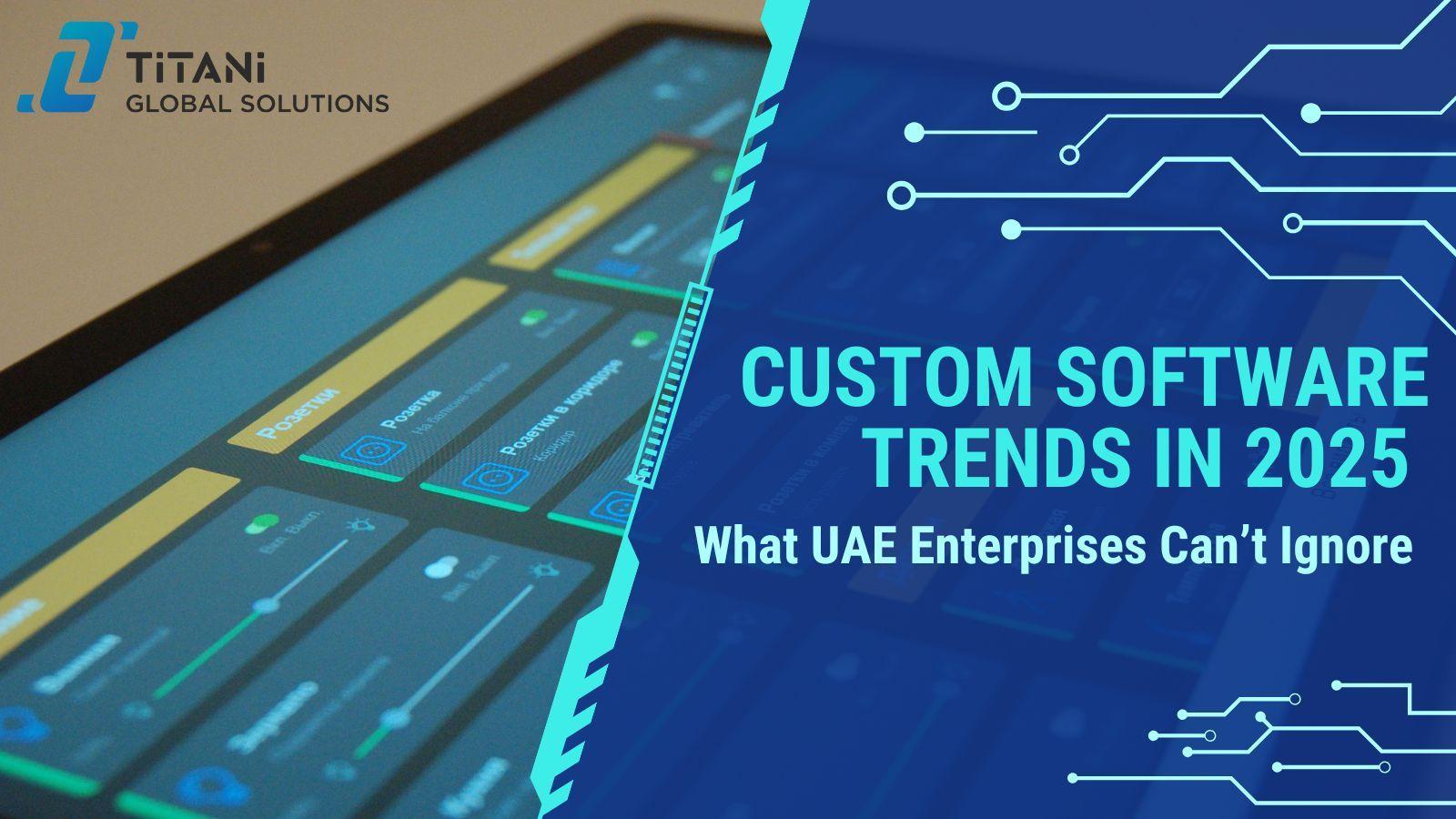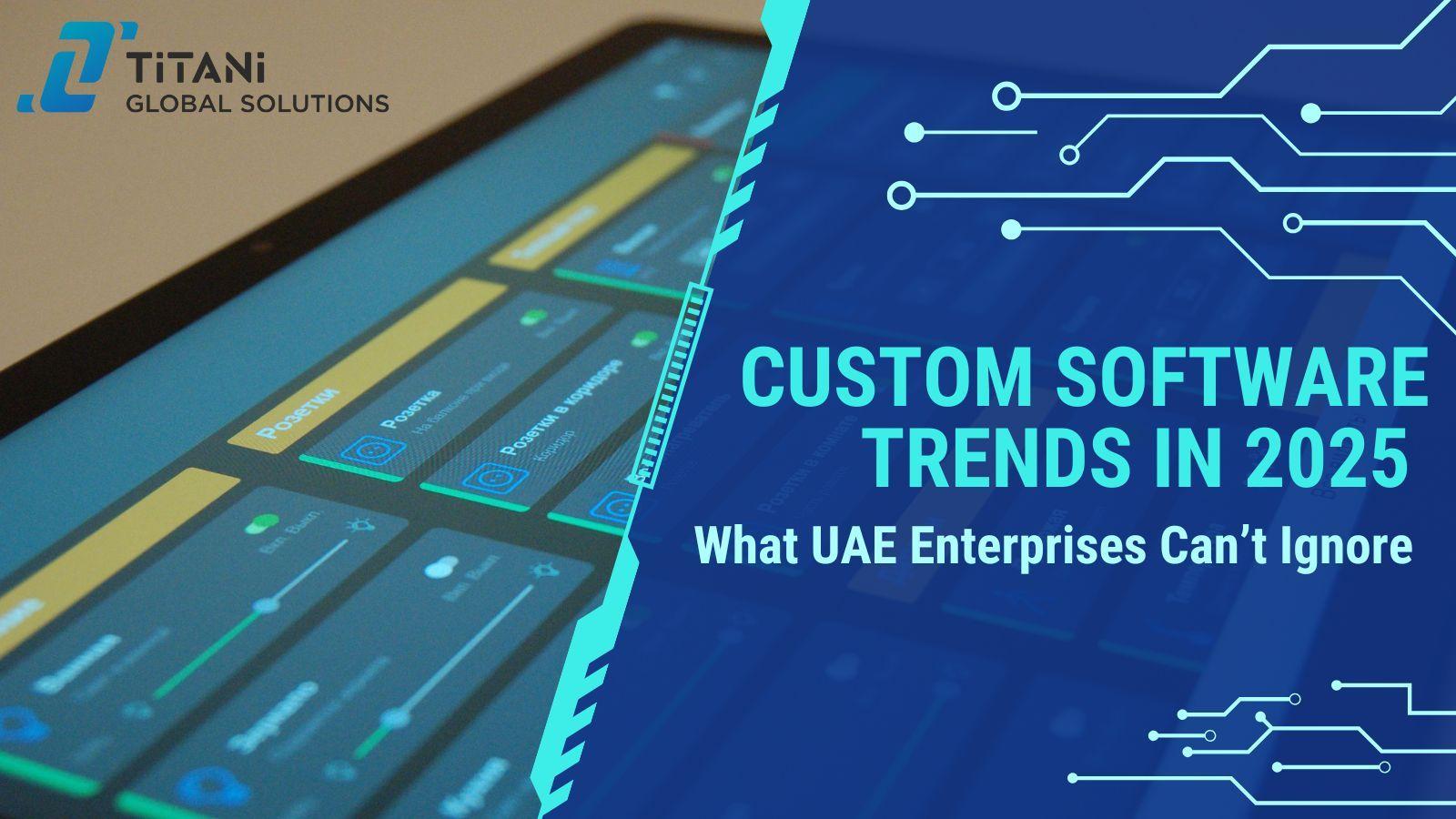Summary for Decision-Makers
In the UAE, custom software has shifted from a “nice-to-have” to a strategic growth engine. Backed by smart city programs like Dubai 10X, a booming startup ecosystem, and strict compliance requirements, enterprises can no longer rely on off-the-shelf tools to stay competitive.
The top 6 trends for 2025 — cloud-native architectures, AI-powered automation, low-code acceleration, blockchain, AI+IoT for sustainability, and cybersecurity with data sovereignty — are reshaping how businesses scale, innovate, and comply with regulations.
For UAE leaders, the takeaway is clear: custom solutions are not just about faster delivery, but about building systems aligned with local laws, cultural context, and long-term ROI. Those who act now will lead the next wave of digital transformation in the region.

Dubai and the wider UAE are no longer just early adopters—they are fast becoming pioneers in custom software innovation. Fueled by robust government backing, ambitious smart city initiatives like Dubai 10X, and an economic pivot away from oil, the custom software sector is booming.
In 2024, the UAE’s custom software market generated approximately USD 973 million, and it's projected to exceed USD 3.25 billion by 2030, with an expected 22% CAGR from 2025 to 2030, according to Grand View Research. Meanwhile, the global custom software development market is forecast to reach USD 43.2 billion in 2025 and nearly USD 100 billion by 2030, growing at an 18–22% rate, based on insights from Mordor Intelligence and The Business Research Company.
These strong growth figures show that custom-built applications have moved from optional tools to strategic enablers—powering innovation in sectors like finance, healthcare, logistics, and government services. For businesses in the UAE, especially those working with agile partners like Titani, understanding these trends isn’t just useful—it’s critical.
UAE’s Top 6 Custom Software Trends In 2025

Custom software development in the UAE is no longer just about coding functionality—it’s about building strategic, scalable systems that integrate with modern cloud, AI, and compliance frameworks. Here are the six standout trends shaping the landscape in 2025:
1. Cloud-Native Development Becomes the Norm
UAE enterprises are increasingly adopting cloud-native architectures to scale efficiently while maintaining performance and security. These apps are purpose-built to run on modern platforms like AWS, Azure, or GCP—ensuring flexibility and cost savings.RSI Concepts confirms this trend is accelerating across e-commerce, logistics, and public sector apps.
2. AI-Powered Automation in Every Workflow (🔥 2025 Priority)
From intelligent process automation to predictive analytics, AI is embedded directly into custom applications. Businesses move beyond dashboards into actionable intelligence—automating tasks, detecting risks, and personalizing customer experiences. As noted in Fingent’s UAE trends report, AI is becoming a foundational layer in software across finance and healthcare.
3. Low-Code/No-Code as a Strategic Add-On
While custom code remains key for core logic, low-code tools are now accelerating internal tools, MVPs, and client portals. According to Techugo, UAE enterprises are combining backend APIs with low-code interfaces to speed up delivery cycles.
4. Blockchain Moving Beyond Crypto
Blockchain is gaining ground in land registries, logistics, and government systems—well beyond financial use cases. Fingent reports demand for blockchain-enabled custom platforms is rising in real estate, logistics, and healthcare.
5. AI + IoT for Operational Sustainability
Custom platforms combining AI and IoT optimize energy use, waste systems, and building automation—especially aligned with UAE’s Net Zero 2050 ambitions. Innowise highlights how UAE enterprises are adopting these solutions to cut costs and meet ESG goals.
6. Cybersecurity & Data Sovereignty at the Core
With increasing regulations, UAE businesses now demand secure, locally hosted custom software, especially in health, finance, and public sectors. Shozon emphasizes security-first development as a top driver in UAE software procurement.
Why Now Matters
These software trends aren’t just technical; they’re strategic levers for growth, compliance, and competitiveness. Here's why every UAE-based organization, from scale-ups to enterprises, should pay close attention:
1. Explosive Market Growth Is Driving Urgency
The custom software market in the UAE is projected to more than triple by 2030, reaching over USD 3.25 billion. This explosive growth isn’t happening in isolation—it's being driven by rising tech adoption, government-backed digital transformation, and an influx of regional VC funding.
In fact, UAE tech startups raised over USD 872 million in Q1 2025 alone, an 865% year-on-year increase, according to Shozon. The race to digitize has officially gone mainstream.
2. Regulatory Pressure Is Shifting Buyer Behavior
Sectors like healthcare, finance, and public services face growing scrutiny over data privacy, digital identity, and compliance. Off-the-shelf software often can’t meet the nuanced legal or infrastructure needs, especially with data residency laws requiring local hosting.
Custom solutions allow enterprises to architect software with built-in compliance—meeting the UAE’s evolving legal frameworks without sacrificing performance.
3. Differentiation Now Lives in the Software Layer
Whether it's a logistics platform, patient portal, or fintech dashboard, customer experience is now defined by software. Companies using templated solutions are struggling to stand out.
Custom applications enable UAE brands to design workflows, interfaces, and logic that map precisely to their operation, resulting in faster delivery, better UX, and stronger loyalty.
4. UAE's Government Vision Aligns with Custom Innovation
Initiatives like Dubai 10X, UAE Strategy for Artificial Intelligence, and Smart Government are accelerating demand for software that’s not only localized—but built for transformation.
Custom platforms give enterprises the flexibility to build integrations with APIs from Emirates ID, government registries, and sector-specific portals.
How to Act on These Trends
Recognizing trends is one thing—acting on them strategically is another. Here’s how UAE-based companies can turn these insights into measurable business value:
1. Audit Your Application Stack
Start by evaluating your current digital infrastructure:
Which systems are outdated or rigid?
Where are manual processes slowing you down?
Are customers or partners experiencing generic software limitations?
An internal audit reveals which parts of your business can benefit most from modernization through custom development.
2. Modernize with a Cloud-Native + Modular Approach
Instead of ripping and replacing everything, adopt a modular strategy:
Migrate core systems to cloud-native architectures.
Build scalable microservices that allow for independent updates.
Use custom APIs to link legacy systems with modern interfaces.
This phased approach lowers risk while unlocking long-term agility.
3. Combine AI & Automation Thoughtfully
Use AI where it creates real operational leverage, such as:
Intelligent routing in logistics
AI-powered document processing in finance
Predictive alerts in facility management
Custom software gives you full control over how, where, and when AI operates in your workflows—without relying on black-box vendor logic.
4. Incorporate Low-Code Tools, But Don’t Rely on Them Alone
Low-code platforms can be effective for:
Internal dashboards
Prototypes
Partner portals
But for core operations, security-critical systems, or highly specialized use cases, you’ll still need the control and flexibility that only custom development provides.
5. Design for Security and Local Compliance
With increasing emphasis on data sovereignty in the UAE, ensure:
Systems are hosted in-country (or via local cloud zones)
Apps follow security-by-design principles
Auditability and traceability are baked into architecture
Building compliance from the ground up saves costly rework down the line.
6. Choose a Partner That Understands the Region
Technology alone isn’t enough—you need a development partner who:
Understands Arabic UX/UI localization
Can navigate the UAE’s digital identity ecosystem
Designs with cultural, legal, and sector-specific context
Titani is built to serve this need—more on that in the next section.
Titani’s Insight
At Titani, we understand that building custom software in the UAE isn’t just about writing code — it’s about solving problems that are unique to this market. That means creating solutions that are not only technically advanced, but also deeply aligned with local infrastructure, regulations, and customer behavior.
When we work with UAE enterprises, we don’t just ask about technical specs — we ask how your users navigate in Arabic and English, how your business aligns with Emirates ID or local data hosting requirements, and how digital tools can reflect your internal workflows, not force you to adapt to someone else’s logic.
That’s why our development approach is designed to be AI-powered, cloud-native, and compliance-ready from day one. Whether we’re automating fleet management for a logistics company, building secure dashboards for a fintech startup, or integrating with government APIs for a smart services provider — our focus is always on long-term control, local agility, and measurable ROI.
For example, a UAE-based logistics client recently partnered with us to improve operational visibility across their regional fleet. By combining predictive analytics, mobile tracking, and API-based integrations with border systems, we helped them reduce manual processing by 40% and cut fleet idle time by 22%. The project was not only technically sound—it also complied with local hosting and data access mandates from the start.
At its core, custom software is about making your business faster, smarter, and more resilient. And in a market like the UAE, those gains can’t be left to off-the-shelf solutions.
Ready to Build What Your Business Really Needs?
The off-the-shelf platforms weren’t built for your business. But custom software can be—when it’s designed with the right architecture, localized insight, and a long-term ROI focus.
At Titani, we help UAE enterprises turn complexity into clarity. Whether you're modernizing legacy systems, integrating AI-driven automation, or building digital infrastructure from the ground up, our team delivers software that fits your operations—not the other way around.
Start with a free consultation to identify where custom development can give you a competitive edge. Or download our UAE Custom Software Readiness Checklist to assess your current tech stack and digital priorities.
Custom software isn't just about code. It's about control, scale, and resilience, especially in a fast-moving market like the UAE.



